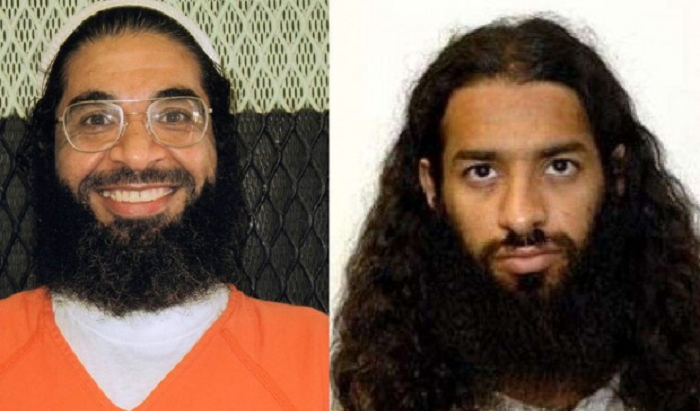
Bring papers on GITMO 2 — Supreme court orders govt
The Supreme Court yesterday ordered the government to produce the document that facilitated the transfer of two former Guantanamo Bay detainees by the United States of America (USA) into the country.
Advertisement
Per the order of the court, the Attorney-General’s (A-G’s) Department is to tender the document as evidence in a suit at the court challenging the legality of the government’s decision to accept the two detainees into the country.
The court, however, held that the production of the document was for the sole purpose of the suit and so it would not be put in the public domain.
In view of the ruling, the plaintiffs’ legal team will have access to the document, known as “notes verbale”, only for the purpose of arguing its case.
The plaintiffs in the suit, Margaret Banful and Henry Nana Boakye, dragged the A-G and the Interior Minister to the Supreme Court for a declaration that the continued stay of Mahmud Umar Bin Atef and Muhammed Salih Al-Dhuby in Ghana is unlawful.
They also want an order directed at the Interior Minister to immediately return the two detainees to the government of the US.
In-camera presentation
Based on a previous order by the court in relation to the suit, the A-G had, on July 6, 2016, made an in-camera presentation of the document to the court.
In yesterday’s ruling, read by Mr Justice William Atuguba, the five-member panel held that after receiving and analysing the ‘’notes verbale’’, it had concluded that the document must be released as evidence to be employed in the trial.
“The case will, therefore, take its normal course,’’ the court said.
The other members of the panel were Ms Justice Sophia Akuffo, Mr Justice Anin Yeboah, Mr Justice Paul Baffoe-Bonnie and Mr Justice Jones Dotse.
Bone of contention
The release of the document became a bone of contention in the case, a situation which led the Supreme Court to make the two separate rulings.
First, it ordered the in-camera presentation of the document and, secondly, that the document was to be produced as evidence in the case.
The A-G’s Department argued that the document was confidential in nature and, therefore, its disclosure would violate the laws of the country.
According to the legal department of the government, any disclosure of the document was against Article 135 (1) of the 1992 Constitution and Section 1 of the State Secrets Act (1960).
Counsel for the plaintiffs, Nana Adjei Baffour-Awuah, on the other hand, argued that the document was not confidential and so disclosing its content would not be a violation of the Constitution and the State Secrets Act (1960).
Detainees
Bin Atef and Al-Dhuby were brought to Ghana in the first week of January 2016 following an agreement reached between the governments of Ghana and the US.
Their presence in the country attracted criticism from many groups in the country.
The US, through its embassy in Ghana, however, assured Ghanaians that their presence would not have any negative impact on the country’s security.
Reliefs
The two applicants in the case are, however, praying the Supreme Court to invoke its original jurisdiction to declare that the continued stay of the two detainees is unlawful.
They are also seeking “a declaration that on a true and proper interpretation of Article 75 of the 1992 Constitution of Ghana, the President of the Republic of Ghana, by agreeing to the transfer of Bin Atef and Al-Dhuby (both former detainees of the Guantanamo Bay) to the Republic of Ghana, required ratification by an Act of Parliament or a resolution of Parliament, supported by the votes of more than one-half of all members of Parliament”.
Unconstitutional
According to the applicants, the President acted unconstitutionally in his failure to obtain the requisite ratification by an Act of Parliament or a resolution of Parliament when he agreed with the government of the US to transfer the two former detainees to Ghana.
They claimed that the reception accorded the two by the President was in excess of his powers under the Constitution and was, therefore, unconstitutional.
The applicants, therefore, prayed the court to hold that upon a true and proper interpretation of Article 58(2) of the 1992 Constitution of Ghana, the President was under an obligation to execute and maintain the Anti-terrorism Act of 2008 (Act 762) and the Immigration Act of 2000 (Act 573), both being laws passed under the 1992 Constitution of Ghana.
“On a true and proper interpretation of Chapter 5 of the 1992 Constitution, the President, by holding Atef and Al-Dhuby under restricted conditions without a valid order of a court of competent jurisdiction, is breaching their fundamental human rights and thus acting in a manner that is unconstitutional,” they said.
Not an agreemnet
The defendants (A-G) has, however, argued in the court that the document that allowed the two detainees to be transferred into the country was not a formal agreement and, therefore, did not fall under Article 75 (2) of the 1992 Constitution.
According to them, the papars were administrative or diplomatic notes that established some form of agreement for the detainees to be brought to Ghana but not an agreement that ought to be brought before Parliament.




